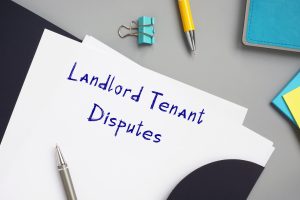 Residential tenants have many more protections than commercial tenants because residential tenants have less bargaining power, or so the law presumes. It is, therefore, much easier to evict a commercial tenant than a residential one. After all, the employees will still have a home to go to post-eviction. Under California law, the power shifts to the landlord in these agreements. Nonetheless, disputes tend to harm both parties, and resolving them tends to be a matter of coming up with a better agreement. Still, it’s important to understand your rights as both a tenant and a landlord when it comes to commercial leases. In this article, our San Jose real estate attorney will discuss how to manage commercial landlord-tenant disputes.
Residential tenants have many more protections than commercial tenants because residential tenants have less bargaining power, or so the law presumes. It is, therefore, much easier to evict a commercial tenant than a residential one. After all, the employees will still have a home to go to post-eviction. Under California law, the power shifts to the landlord in these agreements. Nonetheless, disputes tend to harm both parties, and resolving them tends to be a matter of coming up with a better agreement. Still, it’s important to understand your rights as both a tenant and a landlord when it comes to commercial leases. In this article, our San Jose real estate attorney will discuss how to manage commercial landlord-tenant disputes.
Eviction
There is no guarantee of habitability; a commercial tenant has limited options when it comes to leveraging a landlord to make repairs. Rent cannot be withheld, even in escrow, and there is no guarantee that repairs will be made unless it is in the lease. The covenant to pay rent supersedes all other considerations when it comes to commercial tenancies. A commercial landlord may send an eviction notice for a lease violation or the failure to pay and the commercial tenant will only have three days to respond. Clauses in the lease may prevent you from suing or prevent you from asserting rights as an evictee. Again, the language will be contained in the lease, so it must be read carefully.
Read and review the lease
Your business can be driven into bankruptcy just because you rented from the wrong landlord. While the landlord’s rights are superior to the tenants in commercial leases, the landlord’s motives are predictable. They want to earn income from their real estate. If you succeed in your location, then so should they. Unfortunately, it doesn’t always work out that way, and the law favors landlords.
To avoid the pitfalls of broken lease agreements, it helps to have a San Jose real estate lawyer review the lease provisions. Your real estate lawyer should understand your business, the market you are entering, and the changes you will need to make to the rental property in order to start operations.
Before you sign anything, you will want someone who is an advocate for your business’s interests to ensure that the premises will meet your individual needs. Landlords can sometimes hustle tenants into signing boilerplate leases that completely eliminate any of their rights as tenants to remedy a situation once it turns into a dispute. Avoiding disputes means understanding your needs prior to signing on the dotted line. Once the lease is signed, the landlord has much more leverage than the tenant in any disputes that emerge.
Real Estate Lawyer San Jose
Structure Law Group, LLP helps landlords and tenants negotiate favorable lease agreements that meet the needs of their companies. Call our San Jose real estate lawyer today and we can begin discussing your interests immediately or contact us online.
 San Jose Business Lawyers Blog
San Jose Business Lawyers Blog

